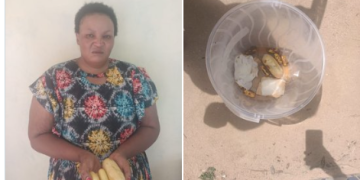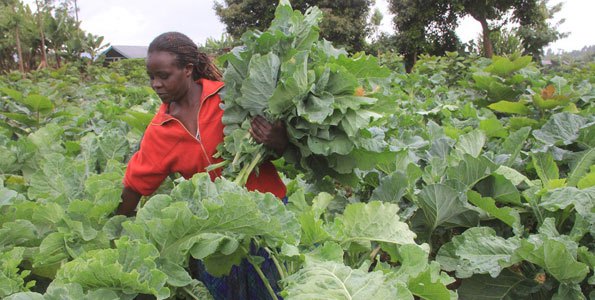Kenya’s government is enforcing strict farm regulations, preventing over three million farmers from selling fruits and vegetables.
The mandatory rules, anchored in law, will only allow large farmers, companies, and importers to supply the food.
Traders buying from uncertified farmers face penalties. The KS1758 Kenyan standard applies over 500 new rules.
Farmers will be required to apply for NEMA licences to grow vegetables at a minimum cost of Sh10,000 per licence, carry out soil and water analyses at a cost of Sh2,500 to Sh5,000, pay for certification with a national or international standards certifier, and prepare dozens more records, including analysing the nutrient content of any compost or manure they use.
International agricultural NGO CABI reported in July it would not be possible for any individual farmers to cover the cost of the certification. Its conclusions followed an aid-funded project that gained certification for the only farmers’ groups yet to be certified, accounting for around 70 of Kenya’s 4.5m farmers. Rough estimates suggest the cost is likely to exceed Sh250,000 per farmer.
A study of Kenyan smallholder farmers done by Mercy Corps found that two-thirds of farmers earn less than Sh7,740 a month from their produce – although the average earnings from fruit and vegetables is higher.
However, in an interview with FarmBizAfrica.com, spokesman for the Horticultural Crop Directorate (HCD) of the Agriculture and Food Authority (AFA) Collins Otieno confirmed that all farmers will be obliged to adhere to the standard, which also requires farmers’ IDs, plot records, and growing records to be kept and submitted to every produce buyer.
The HCD, as well as other agricultural organisations, including the large-farmer lobby groups, the Fresh Produce Consortium of Kenya, and FPEAK, as well as international agricultural organisations have all confirmed the rules will be mandatory for farmers selling produce inside Kenya. Yet, despite intense foreign-aid funding by TradeMark Africa for workshops, strategies, and the implementation of the new rules, none of these organisations has addressed the scale of disruption that will be caused to the country’s food supplies, or the temptation for enforcers to accept bribes where no alternative food sources are available for buyers.
Horticulture is the largest agricultural sub-sector in Kenya. In a FarmBizAfrica national survey of 155 farmers in January 2024, 78 per cent reported growing at least one horticultural crop on their farm. According to an analysis of Kenyan smallholder farmers, these crops earn the country’s farmers an average total monthly income of Sh21,115.39 a month.
Altogether, the government will be closing down earnings to farmers of over Sh280bn a year.
The new rules have been laid out in the Kenya Standard 1758: 2016 (KS 1758) Horticulture Industry Code of Practice.
Before sowing a seed, farmers will be required to get an Environmental Impact Assessment License from NEMA which costs a minimum of Sh10,000.
Farmers selling vegetables, fruits, spices, or herbs inside Kenya will also be required to apply fertiliser only after conducting ‘regular’ soil, water, or plant tests. Yet the tests required typically cost a minimum of Sh2,500 for a soil analysis and Sh4,700 for water tests from the Kenya Forestry Research Institute, moving the application of fertiliser out of reach for most farmers.
Moreover, despite more than half of Kenyan farmers having only a primary level education and an average age of 60 years, if they use animal manure or compost they will be required to calculate its nutrients and analyse the impact it has on their crop yields.
To use pesticides on their farms, horticulture farmers will be required to prove they have recently attended a course on using pesticides, or hire someone trained in mixing and handling pesticides. To get a certificate in pest control in Kenya, they will need to undergo two two-week course, which costs Sh60,000.
Farmers will also be required to keep records of two annual mandatory medical checkups that must include samples of blood cholinesterase levels for anyone handling pesticides. It will also be a requirement that there are trained first aid personnel within the farm with proven training. According to St John Ambulance College, first aid training costs in Kenya costs Shs2,000 to Sh15,000. A refresher course is expected every two years.
Under the new rules, to then sell their produce in local markets, farmers will have to be logged into the National Horticulture Traceability System (NHTS). This mobile application developed by the Agriculture and Food Authority (AFA) and USAID in 2023 will record information such as their name, ID, their farm ID, the farm’s location and block number, a record of the inputs they used, i.e., fertiliser, pesticides, and their supplier, the harvest date, the best before date, and the quantity and weight of produce they’re looking to sell, among other details.
NHTS, which will be available to download on Google Play store will require farmers to put labels with Quick Response (QR) codes on their farm produce that will contain all the information above and can be scanned and retrieved by buyers or consumers.
The KS 1758 certifications themselves will be done by national and international certification bodies, including Bureau Veritas, which have keenly pursued the development of the compulsory standard. No information is yet available on the direct cost of the final certification process per farmer, but standard certifications typically cost from $3,000 to $6,000 each.
TradeMark Africa has not responded to requests for the funding rationale and impact analysis underlying the funding of Kenya’s mandatory KS1758 changeover.
This article was first published on https://farmbizafrica.com










































